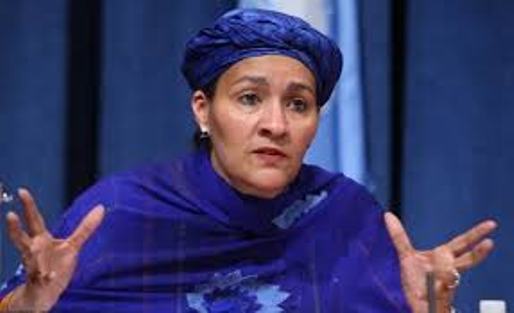Sub-Saharan Africa has become the epicenter of global terrorism, accounting for 59% of all terrorism-related deaths worldwide, according to the United Nations Deputy Secretary-General, Amina Muhammed.
Muhammed delivered this sobering statistic during a UN Security Council meeting on Tuesday, emphasizing the urgent need for African-led counter-terrorism initiatives. The meeting, themed “African-led and Development-focused Counter-Terrorism: Strengthening African Leadership,” highlighted the increasing fragility of the continent in the face of terrorism.
Devastating Statistics
“For the past three years, terrorism-related deaths in Sub-Saharan Africa have exceeded 6,000 annually,” Muhammed stated. She pointed out that Burkina Faso now leads the world in terrorism fatalities, with a shocking 68% increase in deaths.
“Africa has tragically remained the epicenter of global terrorism,” Muhammed declared. “Terrorism, in all its forms, is the most significant threat to peace, security, and sustainable development across the continent today.”
Impact on Women and Communities
The UN Deputy Secretary-General drew attention to the human toll, particularly on women and families. She noted that terrorists frequently exploit women through sexual and gender-based violence, including forced marriages and abductions. “This trauma reverberates through entire communities, deepening societal wounds,” Muhammed explained.
She also highlighted how terrorist networks are evolving. “These groups are pooling resources, fighters, and expertise while leveraging new technologies like unmanned aerial systems,” she said.
The Call for African-Led Solutions
Muhammed stressed the importance of African leadership in combating terrorism. “Countering terrorism must continue to innovate, with respect for human rights and the rule of law at its core,” she said. She urged African nations to unite and work cohesively, backed by international support.
“African-led and African-owned solutions must take the lead in tackling terrorism across the continent,” Muhammed emphasized.
Three Key Priorities
Muhammed outlined three priority areas for tackling terrorism:
- Addressing Root Causes:
Muhammed linked terrorism to societal fragility, poverty, and inequality. “Terrorism thrives where there is poverty, disillusionment, and weak governance,” she said. She underscored the importance of inclusive development strategies, referencing both the UN’s 2030 Agenda and the African Union’s Agenda 2063 as roadmaps for creating resilient societies. - Regional Cooperation:
Regional collaboration is essential to any effective counter-terrorism strategy, Muhammed noted. She called for united and coordinated action to counter fragmented efforts. “The African Union and its counterterrorism center have a leading role to play,” she added. - Human Rights-Centric Approach:
Muhammed advocated for counter-terrorism measures rooted in human rights and accountability. She warned that approaches lacking these elements could exacerbate the conditions that foster extremism.
A Pact for the Future
Muhammed highlighted the “Pact for the Future,” an agreement reached by UN member states in 2024, as a critical framework for combating terrorism. “Now is the time to turn promises into action,” she urged, calling for the immediate implementation of the pact’s provisions.
Global Implications
The UN Deputy Secretary-General’s remarks underline the global implications of Africa’s terrorism crisis. With terrorist groups becoming more sophisticated, their actions threaten not only the continent but also international peace and security.
Burkina Faso: A Grim Leader
The statistics from Burkina Faso reveal the urgency of the situation. The country has seen a dramatic rise in attacks, primarily fueled by extremist groups exploiting poverty and weak governance. Despite international efforts, support remains insufficient to reverse the trend.
A Path Forward
Muhammed’s call for African-led solutions resonates with broader efforts to empower the continent. She highlighted the need for collaboration between governments, international organizations, and local communities to address the drivers of terrorism.
“Ultimately, we can phase down the threat of terrorism together through unified and coherent action,” Muhammed concluded.

